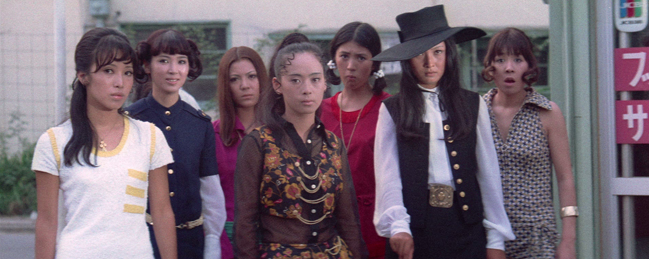
I love genre cinema. I will always have a soft spot for horror, action, sci-fi, and all the subgenres that exist inside those larger categories. What I have never felt any real connection to are those films that exist in the realm of pure sleaze. You know the ones: the films from the ’70s and ’80s, filled with ugly violence and sex that is the opposite of titillating, usually shot on cheap film stock with semi-amateur casts. But knowing these films have a large following and several companies devoted to restoring them makes me wonder what I am missing. With that in mind, I am going to do a deep dive into the world of sleazy exploitation. This is My Exploitation Education.
THE FRONT ROW is presenting midnight screenings of STRAY CAT ROCK: SEX HUNTER at the Music Box Theatre in Chicago on February 9th and 10th. These screenings are being co-sponsored by DAILY GRINDHOUSE and our friends at THE AV CLUB. Check out the Music Box web site for complete details on the screenings.
I have the feeling my usual policy for this column of not doing any research about the film before or after watching it is going to get me into trouble with STRAY CAT ROCK: SEX HUNTER. I am aware that the STRAY CAT ROCK series of films has a huge cult following and that reams of criticism and analysis have been written about them by critics and scholars who have immersed themselves not only in the cinema of Japan, but also the culture and history of the nation. I fear anything I have to say about the film will be easily dismissed as based in ignorance or a redundant rehashing of widely acknowledged ideas about the feminist angle of the film or its head-on way of dealing with the anger of many Japanese people about the American occupation of their country following World War II.
With that disclaimer out of the way, let’s jump right into the fray.
In a town near an old American military base, two gangs rule the streets. The first is a girl gang made up of members from their teens to their early 20’s. They go without a name (unless they are called The Stray Cats and I missed it) and are led by the ultra-cool Mako (Meiko Kaji). The other gang is made up entirely of men in their 20’s through their mid 30’s. They call themselves The Eagles and are led by a slightly sinister, yet sort of charming (at first) guy who calls himself The Baron (Tatsuya Fuji).
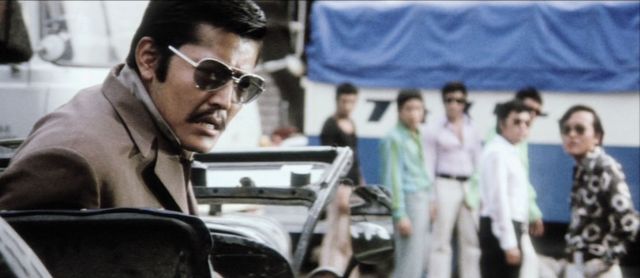
The girl gang roams the town during the day, robbing and beating up lecherous middle-aged men who try to proposition them. At night, they hang out at a club where a smiling girl group sings songs that play into the fantasies of the kind of men the girl gang regularly smack around. Occasionally they hang out with The Eagles at parties where they smoke pot and make out (possibly have sex—it’s never quite clear). It is at one of these parties where The Baron’s right hand man Susumu (Jirô Okazaki) learns that his regular squeeze within the girl gang Mari (Mari Koiso) has left him behind for a new guy.
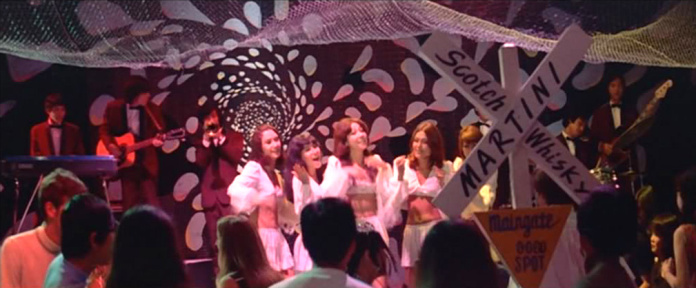
When Susumu confronts Mari and her new boyfriend, he is horrified to discover that Mari is dating a man he distastefully refers to as a “half-breed” (half Japanese, half American—presumably fathered by U.S. servicemen stationed in Japan following WWII). Susumu and several of The Eagles beat the hell out of the boyfriend and tell him to leave town. When The Baron hears about this, he loses his cool. Recalling the rape of his sister by American servicemen, he sets The Eagles on a path of forcing all the men of partial American and European heritage out of the town.
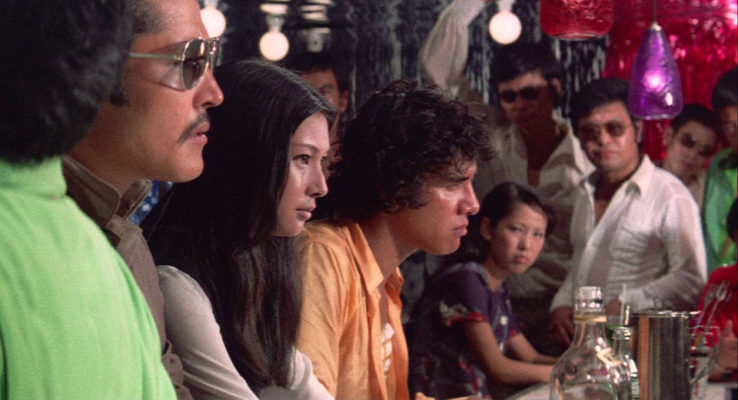
This plotline alone would be enough to power most films, but SEX HUNTER takes it all a step further by going full soap opera. Not only does Mako not approve of The Baron’s sudden terrorism of seemingly half the men in the town, she is in the process of falling for handsome Kazuma (Rikiya Yasuoka), a new-to-town auto mechanic who is searching for the sister he was separated from as a child. And wouldn’t you know it? Kazuma’s father was an American. And did I mention that The Baron considers Mako “his girl?”
SEX HUNTER was released in 1970, yet it feels very modern. While it is rooted in a very specific cultural time and place, the themes of xenophobia, toxic masculinity, and fed up women fighting back against a culture that sees them as pieces of property (at best) are very relevant to what is happening today. But instead of coded talk about making a country great again by grumbling about immigrants from “shithole countries” and building walls or women rallying against ages of sexual harassment/abuse on social media and marching through the streets, the film gives us The Baron screaming the racial slur of “half-breed” while assaulting anyone he deems not pure and Mako chucking Molotov cocktails at a pack of would-be rapists. You cannot exactly credit the film with being a nuanced look at racism and misogyny. Visceral, but not nuanced.
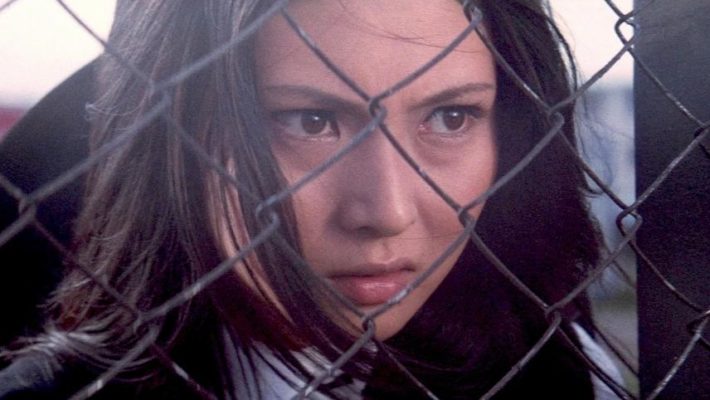
But I do not expect nuance out of a film that calls itself SEX HUNTER. I appreciate that co-writer/director Yasuharu Hasebe was forward thinking enough to consider the way young women were treated as commodities and speak out against such dehumanization. I also am impressed he was able to sneak in the pain that post-War World II Japanese citizens felt about the way the war ended and the American occupation to understand why there was so much misplaced anger toward half-Japanese/half-American children. It is a tricky tightrope to walk, but somehow he keeps the sociological points relevant while he indulges in exploitation material like knife fights, bare-knuckle street brawls, and shoplifting capers on the part of the girl gang.
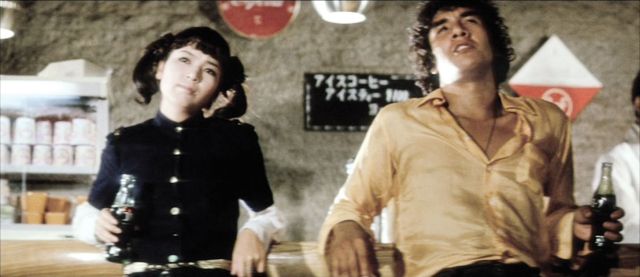
Even without the progressive values in the film, it is a blast of energy. Taking some stylistic cues from the French New Wave of wall-to-wall music, quick cuts, acknowledgement of genre tropes and archetypes, and an emphasis on a style of simply being cool laced with moments of swooning romanticism, Hasebe runs the film through its plot like a sprinter trying to set a world record. His record of a late-’60s swinging Japan is a kaleidoscope of bright colors, stylishly-dressed young men and women having fun driving through the streets in military jeeps and motorcycles, and nightly drinks and drugs at several clubs where the music is always great. If not for the darker turns the story takes, it would be a world where I would love to hang out.
As I understand it, SEX HUNTER has a reputation as the best of the STRAY CAT ROCK series. Even if that is true and the rest of the films feel like a let down compared to my first viewing, I still look forward to devouring them. If they are a disappointment, they will not change how much fun and how surprisingly ahead of its time SEX HUNTER is.
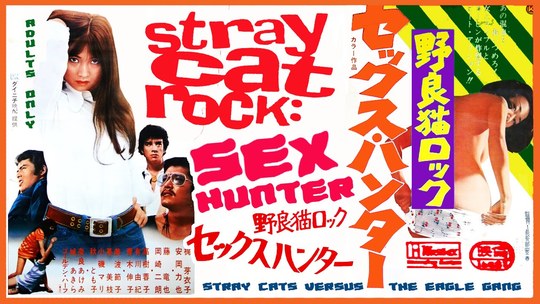
–Matt Wedge (@MovieNerdMatt)
Tags: Chicago, Jiro Okazaki, Mari Koiso, meiko kaji, Music Box Theatre, My Exploitation Education, Rikiya Yasuoka, Stray Cat Rock: Sex Hunter, Tatsuya Fuji, The AV Club, The Front Row, Yasuharu Hasebe


No Comments